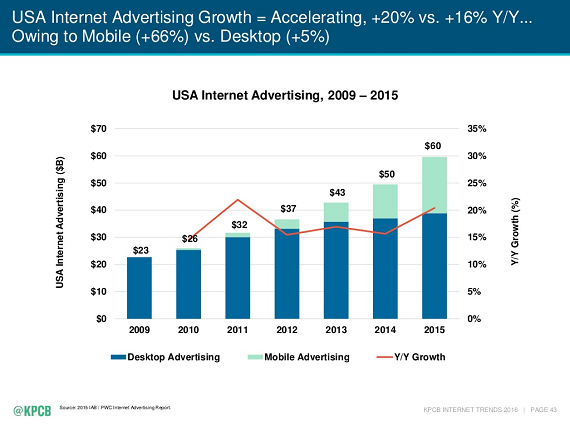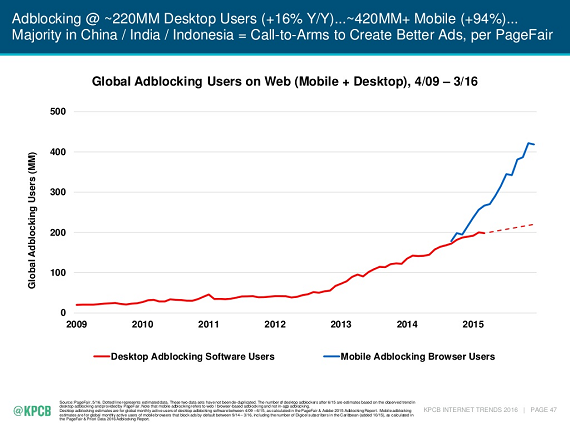
Every year, KPCB partner Mary Meeker releases her Internet Trends report, with insights that capture the trends in Internet and mobile. It has become an important document for looking at how the Internet is evolving, and what to expect in the coming years.
The latest report was put out on Wednesday and there is some really interesting stuff to break out, including a section on Internet advertising, which saw year-to-year growth of 20 percent in 2015, from $50 billion to $60 billion. That is the first time since 2011 that the space has seen significant growth.
That growth being attributed to mobile, which saw an increase of 66 percent from 2014. While desktop still makes up the majority of advertising revenue, it only grew 5 percent in the same timeframe.
 When we think of online advertising revenue, it probably comes down to Facebook versus Google, but there is no contest between them, at least right now, as Google has more triple the amount of ad revenue that Facebook has in the U.S., with roughly $30 million, compared to less than $10 million for Facebook.
When we think of online advertising revenue, it probably comes down to Facebook versus Google, but there is no contest between them, at least right now, as Google has more triple the amount of ad revenue that Facebook has in the U.S., with roughly $30 million, compared to less than $10 million for Facebook.
Facebook has a few things on its side, though. First, it’s growing very fast, over 59 percent year-to-year, versus only 18 percent growth for Google.
There’s also the fact that Facebook is already the leader in global display ad revenue, according to eMarketer, with $17.8 billion in 2015, a nearly 50 percent increase year to year. It’s next closest competitor was Google, with $9.07 billion.
The company is expected to grow another 31 percent in 2016, to $22.37 billion in display ad revenue, more than double Google’s $10.23 billion.
Google, however, remains the leader in search revenue, with $44 billion globally in 2015. No other company even comes close; the next highest is Baidu, with $7 billion. So the takeaway has to be, first, search revenue is a lot more lucrative than display advertising and, second, Facebook has a long way to go before it will be able to overtake Google on the advertising front.

There are still a couple of things standing in the way of Internet advertising revenue reaching its true potential.
First, advertisers are still spending their dollars on old media, the kind that sees a lot less time spent by users. That includes both print and television, both of which have a larger percentage of ad spend than time spent.
The complete opposite is true on mobile, where users spend a quarter of their time, yet only 12 percent of the ad dollars are spent there.
 The reason for that, though, may be us, and our tendency to adblock, especially on mobile. While the number of adblock users on desktop reached 220 million in 2015, the number is nearly double on mobile, reaching 420 million users.
The reason for that, though, may be us, and our tendency to adblock, especially on mobile. While the number of adblock users on desktop reached 220 million in 2015, the number is nearly double on mobile, reaching 420 million users.
It’s an especially big problem in Asian countries, including China, India and Indonesia.
So, until advertisers can find a way to either make better ads, or figure out how to stop users from blocking them, mobile advertising won’t be able to break out the way it should.

(Image source: exactdrive.com)



















